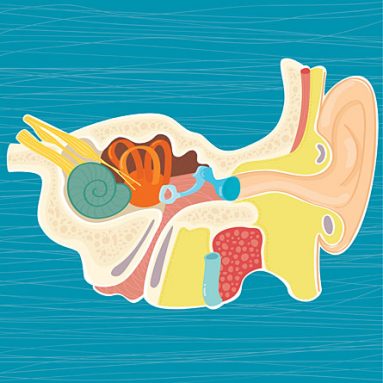Ear pain, weight gain
Scientists have found a link between frequent childhood ear infections and obesity later in life.
By Emily Sohn
Life is already painful for kids who get lots of ear infections. Adding insult to injury, scientists say that these kids may also have to worry about their weight.
This may sound like a strange connection. But a new study suggests that children who often get serious ear infections (bad enough to require medication) are twice as likely to become obese later in life than kids with healthier ears.
 |
|
A middle ear infection is one of the most common of childhood infections. Bacteria trapped in the Eustachian tube causes the middle ear to turn red and swell. And now, science shows nerve damage from the infections could even give you a desire for fatty foods later in life.
|
| friztin / iStockphoto.com |
Why? Frequent ear infections seem to make kids develop a strong preference for fatty foods. And the more fatty foods kids eat, the more weight they gain.
Three out of four children develop an infection in the middle part of their ear at least once by age 3, according to the National Institute on Deafness and Other Communication Disorders, or NIDCD. One out of three kids has at least three middle ear infections by their third birthday.
Researchers from the University of Florida noticed a link between frequent, serious ear infections and obesity after analyzing thousands of questionnaires that asked people about their sense of taste. Data from other surveys show the same link.
To explain the findings, lead researcher Linda Bartoshuk says repeated ear infections might permanently damage a nerve called the chorda tympani. This nerve starts at the front of the tongue, where it picks up taste sensations. From there, the nerve runs through the middle ear to the brain, where it delivers messages about what the tongue just tasted.
Bartoshuk has conducted previous research on the chorda tympani. When the nerve is damaged, she says, people become extra sensitive to the feel or texture of fatty foods, such as butter, which tend to be creamy and slippery. The food doesn’t taste different, but feeling fatty sensations more intensely makes people like the foods even more than usual. That drives them to eat even more fatty foods.
The chorda tympani is not the only nerve that delivers taste messages to the brain, and it is not the only nerve that can go haywire. Other research shows that kids who had their tonsils removed gain weight more often than kids who did not. Bartoshuk says that having your tonsils removed can damage a different taste nerve, which may explain the weight gain.
You’re not doomed to obesity if your ears bother you often, of course, though you might want to focus on eating well and keeping your ice cream portions small. At the same time, consider the plus side: You probably enjoy each juicy bite more than the average person!







